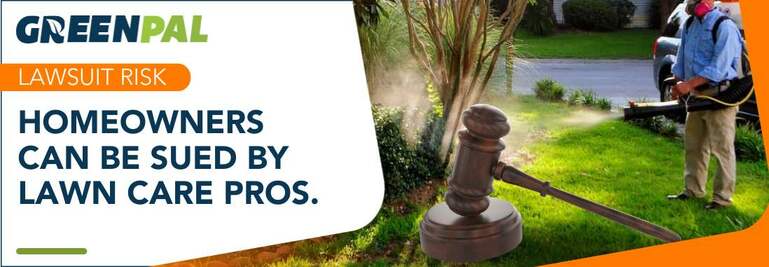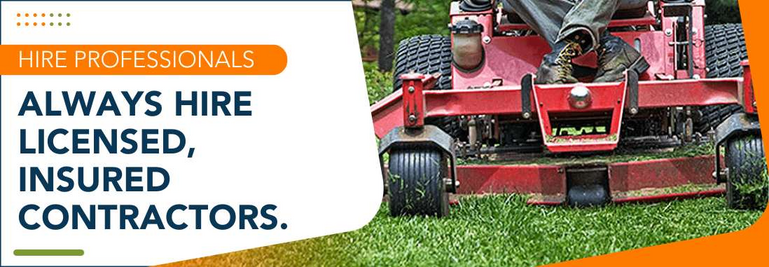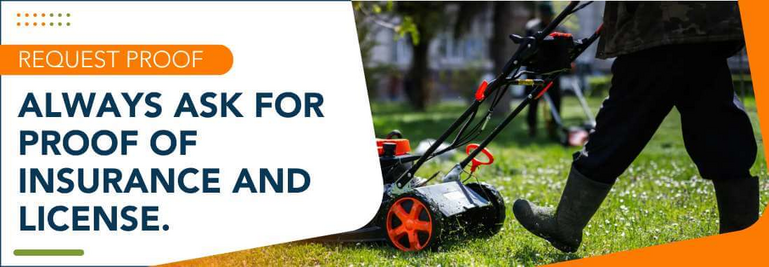Can Homeowners Be Sued by Lawn Care Professionals?

Many homeowners are sometimes surprised to learn that they can get sued by a lawn care professional.
Or any contractor for that matter.
Look, contractors have the right to sue a homeowner to cover the cost of injuries resulting from an incident on a homeowner’s property.
So what can you do to protect yourself from a lawsuit?
Well, here is what you need to know, before it’s too late.
How can I get sued by my lawn care guy?
Like it or not, lawn care professionals may be able to sue you if they are injured on your property while working.
For example, a homeowner hires a lawn cutter in Gallatin, Tn, to mow the lawn and trim the shrubs. However, the lawn care pro suffers a broken ankle because he stepped in a hole while mowing the lawn.
Could the homeowner be liable in this scenario?
Well… The surprising answer to that question is, “Yes!”—the homeowner could be held accountable for any injuries that have occurred on the property.
It gets worse, many homeowners may feel the need to save a few bucks and let the kid in the neighborhood mow the lawn or allow the guy that was recommended by a friend to clean the gutters. By doing this, a homeowner can jeopardize his/her property and possibly bring personal liability into a lawsuit.
So, to prevent a disaster like this from happening, below are 3 that you should keep in mind before hiring any home improvement professional.
Tip #1- Make sure the proper homeowner’s insurance coverage is in place

Fortunately, by having proper insurance can certainly reduce the chances of a homeowner being personally accountable for injuries.
Liability homeowner’s insurance helps protect assets and cover defense costs in the event of a lawsuit due to injuries on a property.
Here’s the deal, most standard homeowner insurance policies provide a minimum of $100,000 worth of coverage, and more is available if one feels the need to be more protected.
Since these policies vary by state and also vary by insurance carrier, double checking with the insurance provider to confirm that proper policies are in place for maximum protection is advisable.
Tip #2- Only hire true professionals

Hiring an unlicensed contractor can expose homeowners to major liability; therefore, making sure the professional being hired is licensed and insured is almost mandatory.
Some homeowner insurance policies will exclude coverage for injury claims if the homeowner hires a company that did not have the proper workers’ compensation and liability insurance.
Professional home improvement companies will always maintain proper insurance to protect a homeowner if and when an incident does occur.
Requiring any and all hired independent contractors to verify and present all certificates of insurance to confirm proper insurance coverage protects the homeowner.
Tip #3- Define the role of the hired help

Figuring out if the hired party is classified as an employee or as an independent contractor can determine whether or not a homeowner is liable for any injury that occurs on the property.
This comes down to how much control the homeowner has over the worker. Hiring a lawn maintenance crew in Kannapolis, North Carolina, that has his/her own equipment and performs yard work for other homeowners would be considered an independent contractor, and the liability of any injury would likely fall on the shoulders of the landscaping pro.
On the other hand, if a homeowner hires an individual to clean a home, gives instructions on how to perform the task, and provides the supplies and tools needed to complete the project, the hired person would be considered an employee, and any costs associated with injury would most likely be borne by the homeowner. Defining these working relationship parameters before entering into any agreement will ensure the homeowner is aware of any and all liabilities.
Key Steps to Minimize Lawsuit Risks
Step | Action Item | Description |
1. Insurance | Verify homeowner's insurance coverage | Ensure your policy includes liability coverage to protect against injury claims on your property. Most standard policies provide a minimum of $100,000 worth of coverage. |
2. Hiring | Only hire licensed and insured professionals | Unlicensed contractors can expose homeowners to major liability. Verify that the professional is licensed and carries workers’ compensation and liability insurance. |
3. Classification | Define the role of the hired help | Determine if the worker is an employee or an independent contractor to understand liability. The amount of control over the worker's methods and tools used influences this classification. |
Frequently Asked Questions

What should I do if a lawn care professional gets injured on my property?
First and foremost, ensure that the individual receives immediate medical attention. Following that, contact your insurance provider to report the incident without delay. It's important to keep detailed records of the incident, including photographs of where the injury occurred and statements from both the injured individual and any witnesses.
This documentation will be essential for processing your insurance claim and for any legal matters that may arise.
What's the Difference Between an Employee and an Independent Contractor in This Context?
The key difference is the level of control and independence. An independent contractor typically provides their own tools, decides their work schedule, and may service multiple clients, limiting your liability for injuries. In contrast, if you hire someone as an employee, provide them with tools, and direct their work, you could be more directly liable for any injuries they suffer on the job.
Do All Homeowner Insurance Policies Cover Contractor Injuries?
Not all policies automatically cover contractor injuries. Coverage for contractor injuries can vary widely between policies. Some may exclude injuries to unlicensed or uninsured contractors.
Homeowners should consult their insurance policy or speak with their insurance agent to confirm coverage specifics and any potential exclusions.
Are homeowners liable for injuries to unlicensed contractors?
Yes, homeowners may face greater liability for injuries to unlicensed contractors. Without proper licensing and insurance, the responsibility for injury costs and legal defense can fall more heavily on the homeowner. This underscores the importance of hiring licensed and insured professionals for any work on the property.
How do I verify a contractor's insurance and licensure?
You should directly ask the contractor for proof of their insurance and license. Genuine professionals will be able to provide you with their insurance certificate and a license number. To verify insurance, reach out to the insurer listed on the certificate to check the validity of the policy. To confirm licensure, contact your local or state licensing board to make sure the contractor has a valid license for the services they offer.

The Bottom Line on Avoiding Getting Sued By Lawn Care Professionals.
Homeowners can potentially get sued by lawn care professionals or other contractors if the workers are injured on their property. To protect themselves from such lawsuits, homeowners should:
1. Hire licensed and insured professionals to avoid liability issues. Some homeowner insurance policies may not cover injury claims if unlicensed contractors are hired.
2. Define the role of the hired help, distinguishing between employees and independent contractors. The level of control the homeowner has over the worker can determine liability.
When hiring anyone to perform work in or around a home, homeowners are opening themselves up to legal headaches if a provider gets injured on the property.
That is why it is so important that the homeowner is covered by the proper insurance and is also cognizant of whom they hire to perform the work.
Putting all of these precautions in place will not guarantee the absence of injury but will certainly reduce the chances of being unprotected if something does go wrong.



 Share
Share











